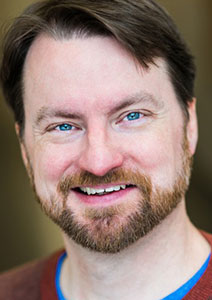Case Western Reserve University researchers to use acting method, wellness strategies for teens with anxiety issues; supported by National Endowment for the Arts
Behavioral research at Case Western Reserve University, which aims to help teens overcome anxiety by blending the power of established wellness strategies with improvisational drama skills, got a boost this week from the National Endowment for the Arts (NEA).
The NEA funded a proposal from Case Western Reserve researcher Amy Przeworski, an associate professor of psychological sciences, and theater instructor Christopher Bohan. The grant supports their ongoing research on the effects of improv theater games, coupled with the wellness techniques on the social well-being of youth with anxiety and depression.

Wellness strategies, Przeworski said, include evaluating the accuracy of one’s thoughts and determining if they are overly negative and inaccurate; being in the present moment; relaxation strategies; and facing situations where one’s anxiety is excessive and unreasonable so they can learn that although anxiety is uncomfortable, it is a temporary experience that one can push through it.
These strategies can be used by virtually anyone to help reduce stress, anxiety and negative emotions, she said.
The NEA announced more than $33 million in project funding nationwide on Jan. 11. It awarded 44 more grants totaling more than $1 million to other Ohio arts organizations, in addition to the Case Western Reserve research grant.
Przeworski and Bohan plan to conduct a “randomized, waitlist-controlled” study this year with Cleveland-area students ages 14 to 17. They will gather data on their hypothesis that improv and wellness techniques will benefit youth with anxiety and depression, their parents and others, such as drama therapists and theater organizations.
A waitlist-controlled study involves a group of participants who receive identical intervention or treatment as those in an experimental group, but at a later time, according to the American Psychological Society.

The teens in the Case Western Reserve study will be randomly assigned to one of three groups: an improv-only intervention, an improv-plus the wellness strategies intervention or the waitlist group.
“One of the things that we want to evaluate is whether improv alone can help those with elevated anxiety or depression,” Przeworski said. “It could help by increasing connections with peers and also by helping teens to be more comfortable with being spontaneous and being the center of attention.”
Analyzing the project’s success will include comparing pre-, post- and follow-up assessments. Those assessments will measure factors such as self-reported anxiety, depression, satisfaction with the intervention, peer connectedness, emotion regulation, experiences with discrimination and attitudes toward the psychological treatment. Parental reports of anxiety and depression also will be collected.
New data for ongoing project
Przeworski and Bohan—who is also a founding member of “Something Dada,” now Cleveland’s longest running improvisational comedy company—had been working together on the foundation of this new NEA-funded project for several years.
They said they hope to eventually create a curriculum for school teachers to use improv and wellness strategies to help teens with anxiety issues.
“That’s the ultimate goal—help a teacher integrate wellness skills into their drama club or class by using improv and the wellness skills,” said Przeworski. “We would like for it to be available for any drama teacher in high school or middle school so that as many teens as possible could benefit.”
A 2021 grant from College of Arts and Sciences Dean Joy Ward’s “Expanding Horizons Initiative” jumpstarted their collaboration and set the stage for the NEA project, Przeworski and Bohan said. The initiative seeks to support research, scholarship, creative endeavors and curricular innovation in the college.

“The incredible promise of interdisciplinary work such as this project is the primary reason for the initiative,” Ward said. “I am so pleased to see this work by Amy and Chris receive recognition from the NEA. Their project is innovative and impactful and has the ability to create positive change for the youth in our community and beyond. I look forward to watching this project come to life in the coming months, and I am most appreciative to all Expanding Horizons donors for making impactful projects like this possible.”
Bohan said hard data to quantify the effects of the improv-wellness combo doesn’t exist, although there is plenty of anecdotal data saying that it works.
“Drama therapy has been around at least 40 years in the United States, at least officially,” Bohan said. “People are doing theater in myriad environments—from prisons to schools to places that help kids who have undergone trauma of many kinds. This is different because it focuses on both improv and wellness strategies and because we will finally be compiling some data.”
The NEA awarded $75,000 to the university with Przeworski listed at the primary investigator.
For more information, contact Mike Scott at mike.scott@case.edu.
This article was originally published Jan. 18, 2022.

